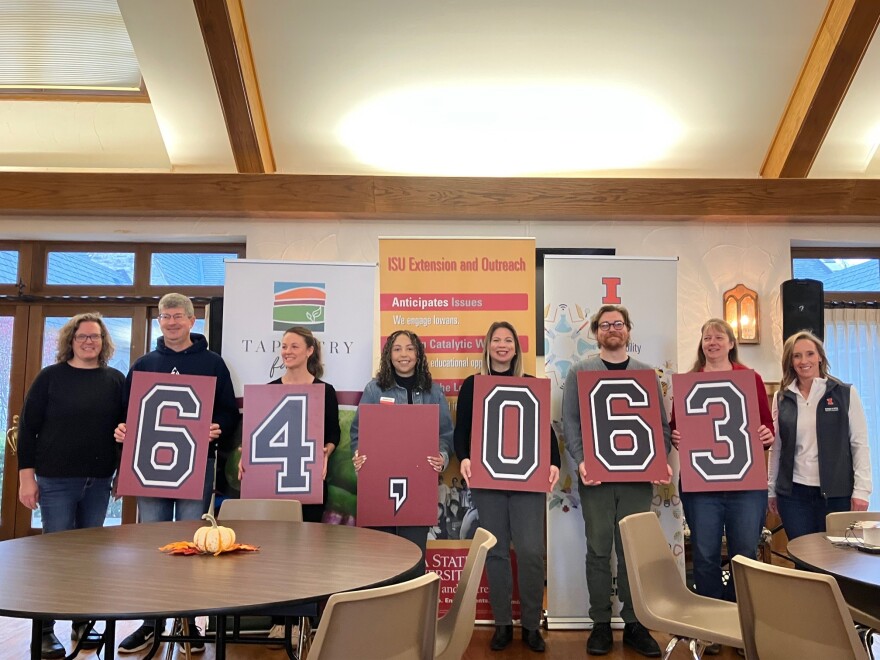It takes a village to help raise up people in need.
A new partnership among Tapestry Farms, River Bend Food Bank and Extension programs of University of Illinois and Iowa State is meeting urgent hunger needs in the Quad Cities area.
GIFT (Growing Illowa Food Together) Gardens launched this past spring, with a goal of growing 5,000 pounds of fresh produce to donate to local food pantries and hunger relief agencies. On Monday morning at Trinity Episcopal Cathedral, the group announced that over 80 volunteers produced 64,063 pounds, distributed to 18 food pantries and community sites in the region.
The community-wide effort invited people to grow a little extra in their home gardens or ministry sites to share with neighbors.
“The idea is simple; the impact is profound,” Tapestry Farms executive director Ann McGlynn said Monday. “In our region spanning eastern Iowa and western Illinois, hunger affects far too many. Currently, one in eight adults and one in six children face food insecurity, unable to reliably access nutritious meals. That's more than 137,000 individuals, a four-year high, struggling to fill their plates.
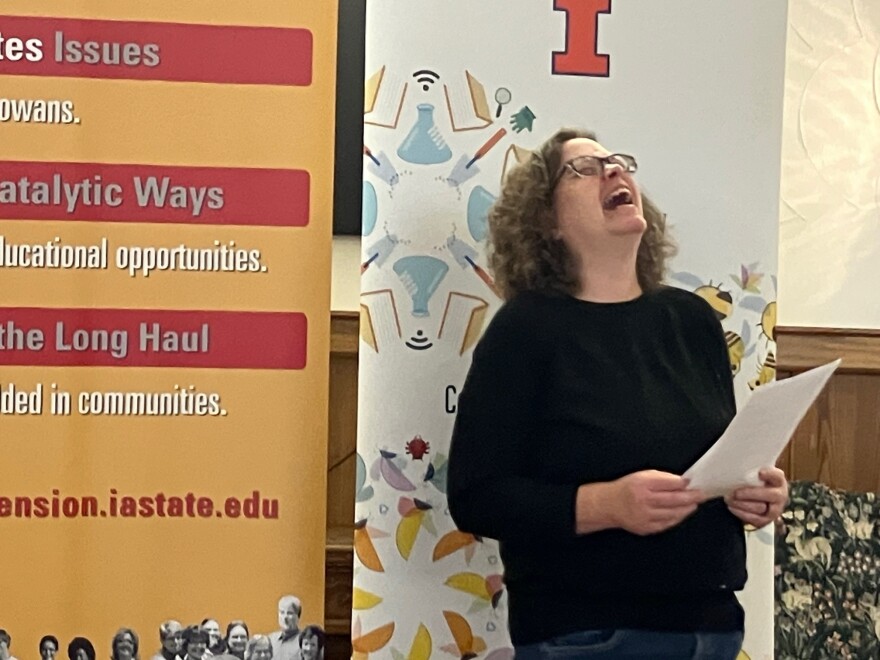
“While food pantries work tirelessly to meet the increasing need, fresh produce remains one of the hardest items to provide,” she noted. “Most donations are shelf stable goods, which are very, very important, but they don't offer the nutrients that fresh fruits and vegetables do. For families living on tight budgets, buying fresh produce often feels out of reach.
“Further compounding the issue are recent historic cuts to SNAP benefits,” with some households seeing an assistance drop from $210 a month to $81 per month,” McGlynn said. “In some cases relevant to Tapestry Farms work, some of the refugee families we serve are completely losing their benefits.”
Tapestry Farms (based at Trinity) invests in the lives of refugees who resettle in the QC, focusing on access, urban farming and building a welcoming future. Tapestry Farms reclaims underutilized land in neighborhoods experiencing food insecurity, growing produce.
The current economic crunch has “left families making impossible choices between paying rent, covering medical needs, fueling cars, or simply eating,” McGlynn said. “When resources like SNAP diminish and food donations fall, food banks become the last safety net for many of our neighbors. That's why fresh produce from our gardens is more than just food. It's critical nutrition that fortifies health, relieves stress and strengthens community resilience. That's where this program makes a difference by turning backyard abundance into community nourishment.”
A variety of organizations came together to start the GIFT Gardens program.
“Gardening is an act of optimism and hope,” said Emily Swihart, horticulture extension educator at University of Illinois. “When given the opportunity to help neighbors in need, it’s not surprising that growers stepped up and shared their harvest. Every donated tomato, carrot or cucumber made a difference, and we celebrate every pound.”

“I think speaks volumes for what our community is all about,” she said of zooming far beyond the GIFT Gardens goal. “This is what gardeners do. This is what Midwesterners do.”
Backyard gardeners contributed 2,234 pounds; Tapestry Farms produced 5,531 pounds, and a cooperative ministry led by Asbury United Methodist Church in Bettendorf (based at a large garden off Eastern Avenue in Davenport) generated over 55,000 pounds more.
“We were blown away,” Swihart said of the result. “It's not lost on us that we're celebrating this during the week of Thanksgiving. We want to give thanks for everybody who is building community. That's what gardens do, right? We connect each other, we feed each other.”
Receiving a true gift
47 million people, including 14 million children, experience food insecurity annually, according to Feeding America. However, many more people, including millions who do not meet the definition of food insecure—turn to the charitable food sector for support.
During the 43-day 2025 government shutdown, over 40 million Americans who rely on the Supplemental Nutrition Assistance Program (SNAP) were affected, leading to increased demand at food banks, which reported a surge in clients.
For example, the food pantry at Zion Lutheran Church in Davenport served more people in the first 10 months of this year than all of 2024. “The number of people in need now is alarming, and it’s pushing Zion’s pantry to its limits,” Zion’s pastor, Clark Olson-Smith, said recently. “Pantry leaders reduced the amount of food offered to each household to meet this demand.”
“The GIFT Gardens program truly is a gift for our community,” River Bend Food Bank CEO Chris Ford said. “Thanks to Tapestry Farms’ vision for this program, 18 of our pantries signed up to receive produce so that they can provide nutritious food to our neighbors. River Bend Food Bank’s 23-county service region is experiencing a four-year high for food insecurity. It is community-driven initiatives like GIFT Gardens that provide not only hunger relief, but also hope in these challenging times.”
“Our role at the food bank really was to help facilitate our partner agencies,” Jayna Gallagher, community engagement manager for River Bend Food Bank, said Monday, noting her nonprofit serves over 400 food pantries and community sites in its 23-county area.
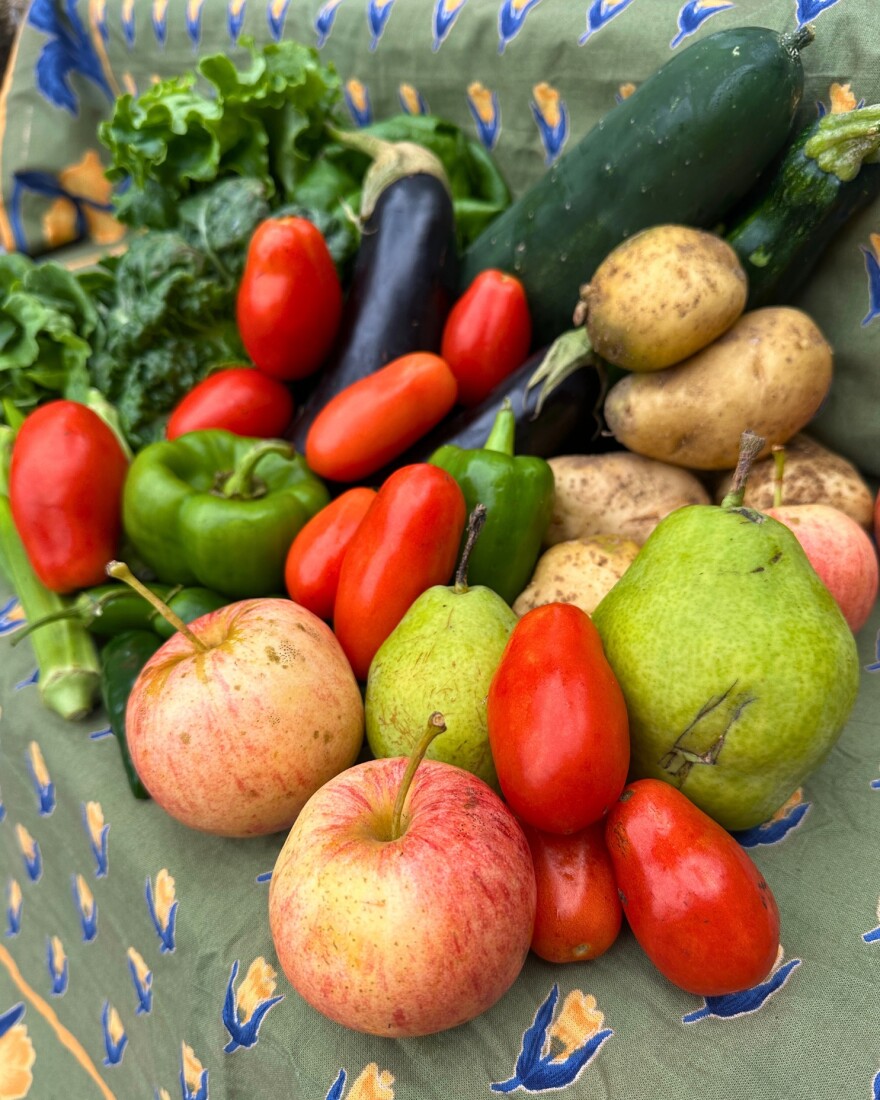
“We know that fruits and vegetables are always the most wanted item at our pantries and they're not always readily available. So this was another way to support that for sure,” she said.
Given cuts to SNAP, the timing of this is vital, particularly near Thanksgiving.
“We know there's a lot of whiplash happening with this administration. Who knows what's to come next year?” Gallagher said. “So I think if our community can support this initiative, be more strategic in meeting the needs of our community.”
GIFT Gardens is the first River Bend partnership with Tapestry Farms, “which is incredible,” she said. “We always love the opportunity to support and partner with our other nonprofits. And I expect this to just grow into an even better and larger opportunity for us.”
Matt Schroeder of Bettendorf is one of the backyard gardeners, who grows produce as a hobby, after having grown up on a family farm in Coal Valley.
“It kind of grows on you, literally,” he said Monday of gardening. “When I had a house, I just thought everybody had a backyard garden, so I started one. Not very big and it's still not very good, but I wanted to do something to help.”
Schroeder grows tomatoes, cucumbers, onions, lettuce and green beans.
He heard about GIFT Gardens since he attends the same church as McGlynn, St. Paul Lutheran Church, Davenport.
“When she started Tapestry Farms years ago, we were doing a garden at St. Paul that was mainly for donations to food pantries,” Schroeder said. “When Tapestry evolved, they took over that plot at St. Paul. So I've kind of helped with that for three or four, five, six years…When she said they were doing this, I'm like, I have to do that because I have extra all the time. In your backyard, you can't grow one tomato, so you get extra and you just want to share. I guess that's why I did it.”
He donated 150 pounds from his garden, about a quarter of which he grows each season.
“I can't do a lot of other contribution with a full-time job, etc. So it's something that's nice to do, even a little bit, you feel like you're helping something,” Schroeder said.
Growing through partnering
University of Illinois Extension wanted to partner with Tapestry Farms, because of its strong existing network of community gardens.
“They have incredible resources and brought to the group really just a level of professionalism and expertise that made us successful,” Swihart said. “We support gardeners, we're able to support people who have questions about their landscape. Tapestry helps people and they have that expertise of distribution. River Bend, of course, helps support all the pantries in the area. So together the network just really worked really well.”
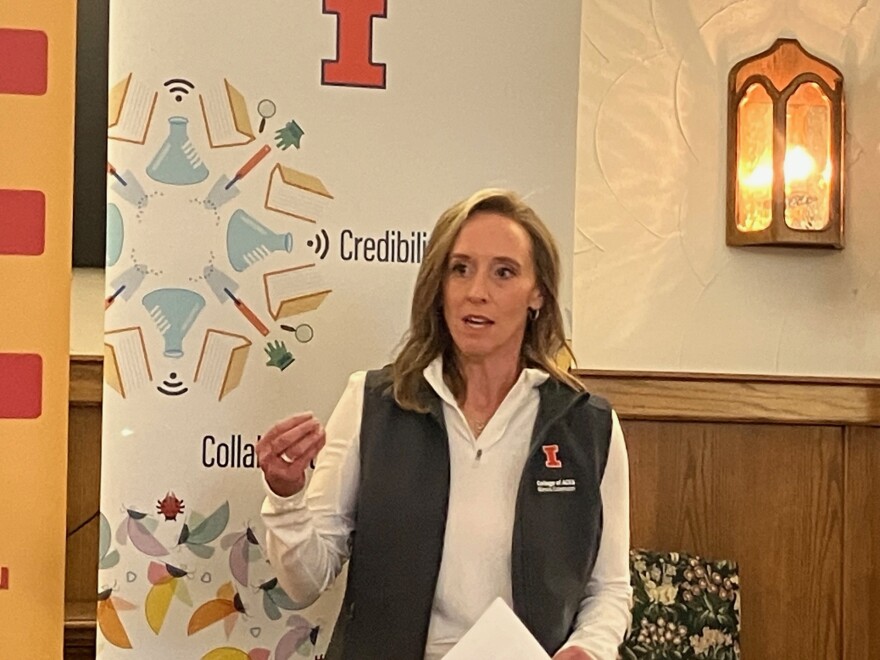
“I am deeply grateful to our community members who dug in and made GIFT Gardens a success,” said Samantha Culver, Iowa State University Extension and Outreach director for Scott County. “This initiative showed the true strength of the Quad Cities—neighbors coming together to grow and give back.
“At ISU Extension and Outreach, our mission is to help Iowans address challenges in their lives, and GIFT Gardens did exactly that by providing fresh, nutritious produce to those who needed it most,” she said. “Each seed planted and each harvest shared contributed to greater food security, one vegetable at a time.”
“Everybody deserves having delicious, nutritious food on their plates, feeding their bodies and their families. So it's been really, really appreciated,” Swihart said. “We hope to expand next year and do more to help support gardeners and help support that connection between pantries and the people that are growing the food and the people that need the food.”
Dave Phillips of Bettendorf was thrilled with the new program. He is coordinator for the Asbury Garden Ministry, which gardens a 1.2-acre plot donated by the Grace Evangelical Free Church at 5520 Eastern Avenue in Davenport. The ministry was initiated in the spring of 2002 and they’ve been at the current location north of 53rd in Davenport since 2012. They’ve produced nearly 900,000 pounds of food over 23 years and expect to hit 1 million in two years, Phillips said.
This past spring, the ministry came under the auspices of Tapestry Farms.
“This partnership has been a Godsend as it has provided the ministry additional volunteers and has helped to ensure its continued long-term viability,” Phillips said.
Adding to recent Student Hunger Drive success
The new produce complements the recently concluded 39th-annual Student Hunger Drive, which smashed records thanks to the power of students and River Bend Food Bank’s new Million Meals Match initiative.
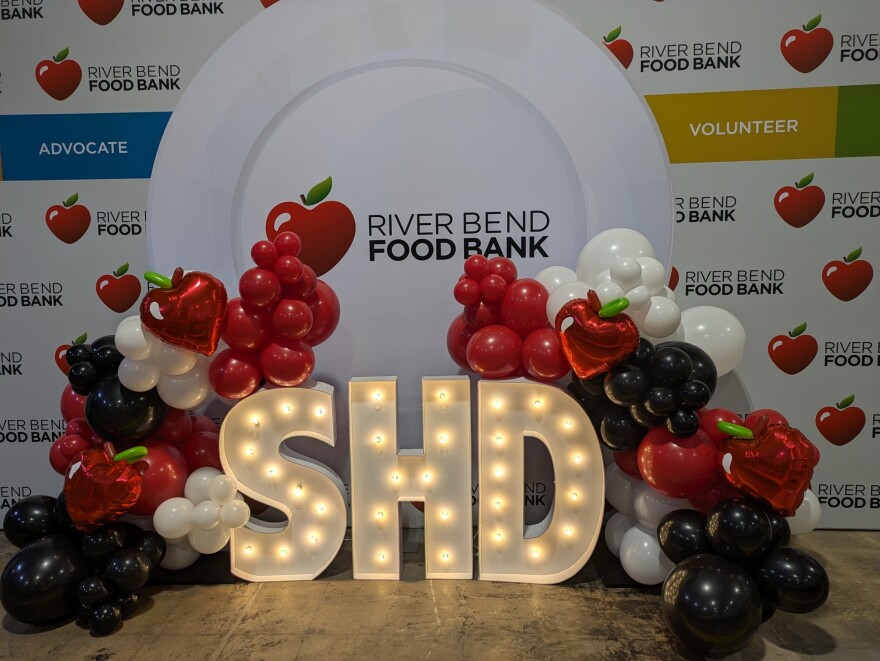
On Nov. 6, 2025, students announced that this year’s Student Hunger Drive raised a grand total of 3,038,599 meals. That includes 926,393 meals raised by the 16 Quad-Cities area high schools participating in this year’s drive, an increase from last year’s drive which raised 787,186 meals.
This year’s top school winners in each division:
Division A: Pleasant Valley High School
Division B: Alleman High School
Division C: Rivermont Collegiate
Additionally, this year the Million Meals Match – River Bend Food Bank’s first-time ask to businesses and community leaders – raised 2,112,206 meals, boosting the 2025 Student Hunger Drive to its three-million meal total.
“Students are and always will be the heart and the engine of Student Hunger Drive,” said Jayna Gallagher, River Bend Food Bank community engagement manager. “The funds and food raised by our students coupled with the contributions of our Million Meals Match supporters has delivered incredible support and hope for our community when we need it most.”
This story was produced by WVIK, Quad Cities NPR. We rely on financial support from our listeners and readers to provide coverage of the issues that matter to the Quad Cities region and beyond. As someone who values the content created by WVIK's news department, please consider making a financial contribution to support our work.

